The month of June has for the past 50 years been a time of celebration for the lesbian, gay, bisexual, transgender, and queer (LGBTQ+) community around the globe.
While Pride Month now includes rainbow-wrapped parades, jubilant dance and music, the hot summer day that led to the creation of Pride is remembered as a police raid on New York City’s Stonewall Inn.
The police stormed the gay night club on June 28, 1969, arresting patrons and loading them into police cruisers, during a time when a number of homophobic laws were in effect. That includes an executive order signed by President Eisenhower in 1953 that banned gay people from holding federal jobs. After the police raid, a crowd of Stonewall Inn patrons and neighbors began to riot, leading to six days of protests and violent clashes with law enforcement. Among the many people engaged in the Stonewall uprising, Stormé DeLarverie – dubbed the ‘Rosa Parks of the gay community’ – is widely regarded as the woman who started the fight back against the police during the Stonewall raid. Marsha P. Johnson, a gay liberation activist and self-identified drag queen, was another one of the prominent figures in the uprising.
The clash at Stonewall is considered the catalyst for the Gay Rights Movement in the U.S. and around the world. It would take decades for the many laws restricting gay people’s employment, housing and relationships to be lifted. Not until June 26, 2015, nearly 50 years after the Stonewall riots, did the U.S. Supreme Court strike down all state bans on same-sex marriage.
Pride marches today are filled with colorful clothing, music and self-expression but the demonstrations continue to be politically motivated. That’s because there are still legal acts of discrimination against LGBTQ+ people in the U.S. and many other countries around the world.
Despite the history of discrimination against the queer community, LGBTQ people have emerged as leaders in their field across politics, science and medicine, arts and entertainment and more. For many years, depictions of homosexuality in film were prohibited under the Hays Code but now, LGBTQ themes and stories are more prevalent on the silver screen. However, a report found that LGBTQ themes were found in half of the past decade’s 20 most-banned books. Even in the arts, censorship of queer people and themes still occurs today.
The Los Angeles Public Library has curated a family-friendly video series that celebrate Pride Month. Check them out:
Drag Queen story hour with Pickle
Pickle joins the library to read children’s literature to kids of all ages. Drag Queens bring humor, play, glamour and fantasy—all qualities that delight children and entertain adults as well.
Your Author Series: Mike Curato
Hang out with writer and illustrator Mike Curato as he shares his book, Flamer. The graphic novel is about friendship, self-esteem, sexuality, and the battle between being like everyone else to “fit in.”
Los Angeles has a rich and often overlooked lesbian, gay, bisexual, transgender, and queer (LGBTQIA) history. Los Angeles was home to the world’s first gay pride parade, the first gay synagogue, and the longest-running LGBTQIA publication in the country as well as many other cultural, political, and social efforts locally that have had far-reaching impact. In this video, the library explores four places associated with L.A.’s diverse LGBTQIA heritage and learn about the important grassroots community efforts to preserve and document these culturally significant sites.
Bilingual Story time with Josue Cuenta Cuentos
Join the LAPL for a special bilingual pride story time with Josue Cuenta Cuentos.


